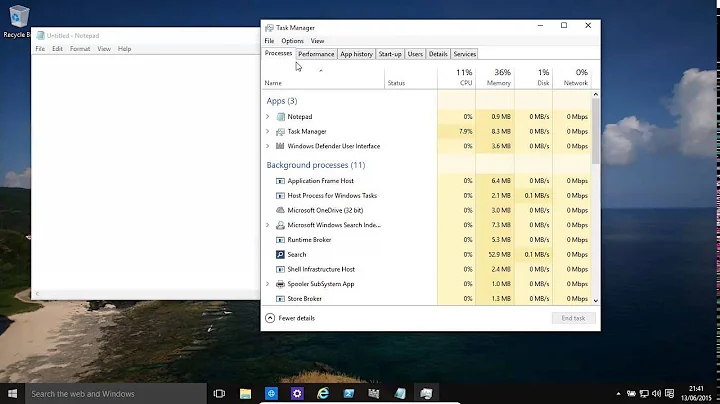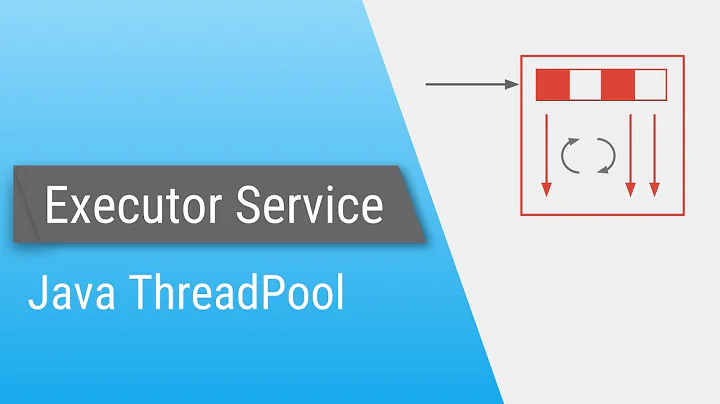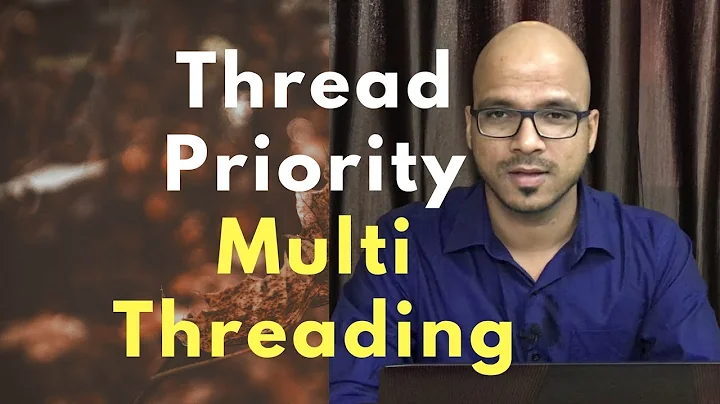Java Executors: how can I set task priority?
Solution 1
Currently the only concrete implementations of the Executor interface are the ThreadPoolExecutor and the ScheduledThreadpoolExecutor
Instead of using the utility / factory class Executors, you should create an instance using a constructor.
You can pass a BlockingQueue to the constructors of the ThreadPoolExecutor.
One of the implementations of the BlockingQueue, the PriorityBlockingQueue lets you pass a Comparator to a constructor, that way enabling you to decide the order of execution.
Solution 2
The idea here is to use a PriorityBlockingQueue in the executor. For this:
- Create a comparator that would compare our futures.
- Create a proxy for the Future to hold a priority.
- Override 'newTaskFor' in order to wrap every future in our proxy.
First you need to hold priority on your future:
class PriorityFuture<T> implements RunnableFuture<T> {
private RunnableFuture<T> src;
private int priority;
public PriorityFuture(RunnableFuture<T> other, int priority) {
this.src = other;
this.priority = priority;
}
public int getPriority() {
return priority;
}
public boolean cancel(boolean mayInterruptIfRunning) {
return src.cancel(mayInterruptIfRunning);
}
public boolean isCancelled() {
return src.isCancelled();
}
public boolean isDone() {
return src.isDone();
}
public T get() throws InterruptedException, ExecutionException {
return src.get();
}
public T get(long timeout, TimeUnit unit) throws InterruptedException, ExecutionException, TimeoutException {
return src.get();
}
public void run() {
src.run();
}
}
Next you need to define comparator that would correctly sort the priority futures:
class PriorityFutureComparator implements Comparator<Runnable> {
public int compare(Runnable o1, Runnable o2) {
if (o1 == null && o2 == null)
return 0;
else if (o1 == null)
return -1;
else if (o2 == null)
return 1;
else {
int p1 = ((PriorityFuture<?>) o1).getPriority();
int p2 = ((PriorityFuture<?>) o2).getPriority();
return p1 > p2 ? 1 : (p1 == p2 ? 0 : -1);
}
}
}
Next let's assume we have a lengthy job like this:
class LenthyJob implements Callable<Long> {
private int priority;
public LenthyJob(int priority) {
this.priority = priority;
}
public Long call() throws Exception {
System.out.println("Executing: " + priority);
long num = 1000000;
for (int i = 0; i < 1000000; i++) {
num *= Math.random() * 1000;
num /= Math.random() * 1000;
if (num == 0)
num = 1000000;
}
return num;
}
public int getPriority() {
return priority;
}
}
Then in order to execute these jobs in priority the code will look like:
public class TestPQ {
public static void main(String[] args) throws InterruptedException, ExecutionException {
int nThreads = 2;
int qInitialSize = 10;
ExecutorService exec = new ThreadPoolExecutor(nThreads, nThreads, 0L, TimeUnit.MILLISECONDS,
new PriorityBlockingQueue<Runnable>(qInitialSize, new PriorityFutureComparator())) {
protected <T> RunnableFuture<T> newTaskFor(Callable<T> callable) {
RunnableFuture<T> newTaskFor = super.newTaskFor(callable);
return new PriorityFuture<T>(newTaskFor, ((LenthyJob) callable).getPriority());
}
};
for (int i = 0; i < 20; i++) {
int priority = (int) (Math.random() * 100);
System.out.println("Scheduling: " + priority);
LenthyJob job = new LenthyJob(priority);
exec.submit(job);
}
}
}
This is a lot of code but that's nearly the only way this can be accomplished.
On my machine the output is like the following:
Scheduling: 39
Scheduling: 90
Scheduling: 88
Executing: 39
Scheduling: 75
Executing: 90
Scheduling: 15
Scheduling: 2
Scheduling: 5
Scheduling: 24
Scheduling: 82
Scheduling: 81
Scheduling: 3
Scheduling: 23
Scheduling: 7
Scheduling: 40
Scheduling: 77
Scheduling: 49
Scheduling: 34
Scheduling: 22
Scheduling: 97
Scheduling: 33
Executing: 2
Executing: 3
Executing: 5
Executing: 7
Executing: 15
Executing: 22
Executing: 23
Executing: 24
Executing: 33
Executing: 34
Executing: 40
Executing: 49
Executing: 75
Executing: 77
Executing: 81
Executing: 82
Executing: 88
Executing: 97
Solution 3
You can implement your own ThreadFactory and set it within ThreadPoolExecutor like this:
ThreadPoolExecutor threadPool = new ThreadPoolExecutor(1, numOfWorkerThreads, 0L, TimeUnit.MILLISECONDS, new LinkedBlockingQueue<Runnable>());
threadPool.setThreadFactory(new OpJobThreadFactory(Thread.NORM_PRIORITY-2));
where my OpJobThreadFactory looks like the following:
public final static class OpJobThreadFactory implements ThreadFactory {
private int priority;
private boolean daemon;
private final String namePrefix;
private static final AtomicInteger poolNumber = new AtomicInteger(1);
private final AtomicInteger threadNumber = new AtomicInteger(1);
public OpJobThreadFactory(int priority) {
this(priority, true);
}
public OpJobThreadFactory(int priority, boolean daemon) {
this.priority = priority;
this.daemon = daemon;
namePrefix = "jobpool-" +poolNumber.getAndIncrement() + "-thread-";
}
@Override
public Thread newThread(Runnable r) {
Thread t = new Thread(r, namePrefix + threadNumber.getAndIncrement());
t.setDaemon(daemon);
t.setPriority(priority);
return t;
}
}
Solution 4
you can use ThreadPoolExecutor with Priority blocking queue How to implement PriorityBlockingQueue with ThreadPoolExecutor and custom tasks
Solution 5
You can specify a ThreadFactory in the ThreadPoolExecutor constructor (or Executors factory method). This allows you to provide threads of a given thread priority for the executor.
To get different thread priorities for different jobs, you'd need to send them to executors with different thread factories.
Related videos on Youtube
Roman
Updated on March 17, 2021Comments
-
 Roman about 3 years
Roman about 3 yearsIs there a possibility to set priority to tasks which are executed by Executors? I've found some statements in JCIP about it's possible but I cannot find any example and I cannot find anything related in docs.
From JCIP:
An execution policy specifies the "what, where, when, and how" of task execution, including:
- ...
- In what order should tasks be executed (FIFO, LIFO, priority order)?
- ...
UPD: I realized that I asked not exactly what I wanted to ask. What I really wanted is:
How to use/emulate setting threads priority (i.e. what was
thread.setPriority()) with executors framework? -
Tim Bender almost 14 years+1 PriorityBlockingQueue is the way to go. You can implement a Comparator or make the tasks themselves Comparable.
-
 Engineer over 11 yearsComments are comments; answers are answers. Comments are not answers. Answers are not comments. If it does not answer the question being asked, it is, in fact, a comment.
Engineer over 11 yearsComments are comments; answers are answers. Comments are not answers. Answers are not comments. If it does not answer the question being asked, it is, in fact, a comment. -
TedTrippin about 11 years+1 @Nick - Ha ha, love it! Why use one word when you could use a lengthy, sarky comment. Good point and well (cheekily) made.
-
Snicolas almost 11 yearsThis article is a great reference : binkley.blogspot.fr/2009/04/jumping-work-queue-in-executor.html
-
 m02ph3u5 over 8 yearsWhile the accepted answer does answer the question this one provides a working solution. Thanks a lot.
m02ph3u5 over 8 yearsWhile the accepted answer does answer the question this one provides a working solution. Thanks a lot. -
Arash over 8 yearsThanks for your answer. Would it be possible to use this approach with ExecutorCompletionService? I tried to pass in the your ExecutorService object in the ExecutorCompletionService constructor but the result cannot be casted to PriorityFuture in the comparator.
-
 Farhan Shirgill Ansari over 7 yearsI tested on my machine. It is not correct. On my machine, I got Executing 72 before Executing 3, which is plainly wrong.
Farhan Shirgill Ansari over 7 yearsI tested on my machine. It is not correct. On my machine, I got Executing 72 before Executing 3, which is plainly wrong. -
 Daniel Hári about 7 yearsMy solution orders tasks by priority, but preserving submit order at same priority levels: stackoverflow.com/a/42831172/1386911
Daniel Hári about 7 yearsMy solution orders tasks by priority, but preserving submit order at same priority levels: stackoverflow.com/a/42831172/1386911 -
Raghu over 6 yearsThe cleanest solution I could find for Callable Jobs, Thank you.
-
 Adnan Amman Ullah over 4 yearsHi, i am encountering with type cast error while using the above code....
Adnan Amman Ullah over 4 yearsHi, i am encountering with type cast error while using the above code....int p1 = ((PriorityFuture<?>) o1).getPriority();java.util.concurrent.FutureTask cannot be cast to com.i2c.loyalty.handlers.datasynchandler.utils.InstancePriorityFuture thisInstancePriorityFutureimplementsRunnableFuturecan someone assist please? -
fast3r over 4 yearsThank you for spotting this @Robert, I've updated the link to the correct URL






